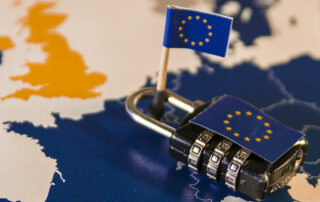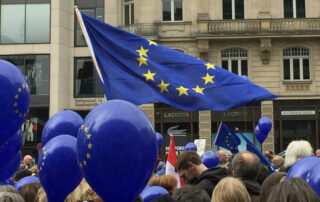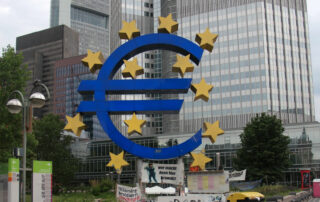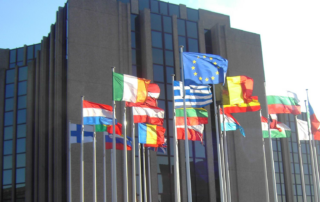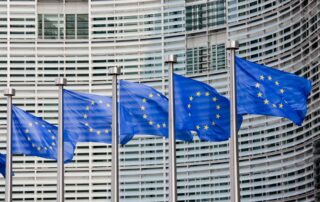European Patent Office encouraging blockchain businesses to protect their IP
As China continues to race ahead of the rest of the world in terms of blockchain patents filed, the European Patent Office is encouraging blockchain businesses in the region to file more patent applications.
How EU money laundering laws will impact crypto investors
Members of the European Parliament have cast their votes overwhelmingly in favor of a new directive that introduces stricter countermeasures against money laundering across Europe — a move that will have consequences for crypto investors
Should blockchain companies be worried about Europe’s GDPR rules?
To all appearances, the EU has been more proactive in dealing with blockchain technology than its US counterpart and it is also making a bigger effort to tackle "big tech" on data malpractices. But with the General Data Protection Regulation (GDPR) coming into effect on May 25, will it have an impact on blockchain innovation?
Blockchain Is Coming Everywhere, Ready or Not
The applications of blockchain technology will spread in 2018 far beyond bitcoin and, perhaps more surprisingly, way beyond financial services. Significant disruption and new business opportunities are on the menu. Four of the most-critical benefits from distributed-ledger technology can be encapsulated within trust, transparency, cost and speed. Where will the disruption occur?
The ICO Rollercoaster – The securities question as seen from Europe
It is difficult to know for sure where the ICO ride will stop, but Initial Coin Offerings are an important development on the global start-up and fundraising landscape. Ignore the ICO trend at your peril. But participate with caution. Not all of these rollercoasters have been built with the same standards or safety checks, or within the bounds of relevant regulations. But amid the wild ride, regulators have shown tolerance and an interest in encouraging innovation.
Turkey to be cashless by 2023
I spend a lot of time talking with my friends in Turkey, particularly since the big change in climate after the protests last year. Nevertheless, from a financial markets point of view, it’s a fascinating place. One of the first to be contactless and, more recently, one of the first to offer social retail banking.
Blockchain Industry Report Q1 2017
Blockchain funding is higher than ever, and despite being a smaller market, Europe has a strong focus on the technology, according to a new industry report from Funderbeam.
Europe may become the hot-spot for Blockchain disruption
If you are interested in Blockchain, you should maybe look to north-western Europe, in particular Ireland, The Netherlands, and naturally The UK with London still being the fintech capital of the world.
Blockchain based electricity management pilot coming to Europe
Three major energy companies in Europe, including the leading central European electricity Transmission System Operator (TSO), TenneT, have announced that they are working with IBM on blockchain solutions for managing electricity.
Fintech: A More Competitive And Innovative European Financial Sector
This consultation seeks input from stakeholders to further develop the Commission's policy approach towards technological innovation in financial services. It seeks input in terms of stakeholders' perspectives on new technologies' impact on the European financial services sector, both from the perspective of providers of financial services and consumers, and whether the regulatory and supervisory framework fosters technological innovation in line with its three core principles of technologic neutrality, proportionality and integrity. The feedback will help the Commission to gauge how FinTech can make the EU Single Market for financial services more competitive, inclusive and efficient.
European Central Bank assessing ‘cash-like’ digital money
Yves Mersch, a member of the Executive Board of the European Central Bank (ECB), recently gave a [speech](https://www.ecb.europa.eu/press/key/date/2017/html/sp170116.en.html) discussing the details of a Central Bank-controlled digital currency referred to as Digital Base Money (DBM). Mersch says the ECB is currently considering the adoption of DBM, in one of two forms, centrally-controlled accounts somewhat like debit cards or Paypal, and an anonymous, cash-like DBM, which would be more like a cryptocurrency.
European banks developing Digital Trade Chain
Deutsche Bank, HSBC, KBC, Natixis, Rabobank, Société Générale and UniCredit recently signed a Memorandum of Understanding in Brussels, agreeing to collaborate on the development and commercialization of a new product called Digital Trade Chain (DTC).
AID:Tech offers blockchain solutions to help United Nations and European Commission with refugee problems
The 2016 European Social Innovation Competition focuses on social innovation for refugees and migrants, as the world is facing an unprecedented displacement crisis. More than 65 million people are now forcibly displaced as a result of violent conflicts and natural disasters.
Editing the uneditable Blockchain: Why distributed ledger technology must adapt to an imperfect world
This paper looks at why distributed ledger technologyâapplied to enterprise and permissioned networksâwill need to evolve to adapt to an imperfect world where human error, laws and mischief will require more flexibility. It looks at the mixed blessing of the indelible ledger in light of Europeâs âright to be forgottenâ laws, recent high-profile cybercurrency thefts and the age-old âfat fingerâ errors that have brought exponential harm to financial services.
EU Intellectual Property Office research describes 25 illegal business models, only 8 mention Bitcoin
The European Union’s Intellectual Property Office, better known as EUIPO, just published a 78-page report, “Research on Online Business Models Infringing Intellectual Property Rights,” with the help of professional services firm Deloitte.
The European Commission’s divide over cryptocurrency regulation grows wider
The European Union (EU) is currently in a battle over how to treat bitcoin and cryptocurrencies. Opposing camps from within the European Commission (EC) both released separate reports dealing with new regulations over cryptocurrencies on Tuesday.


